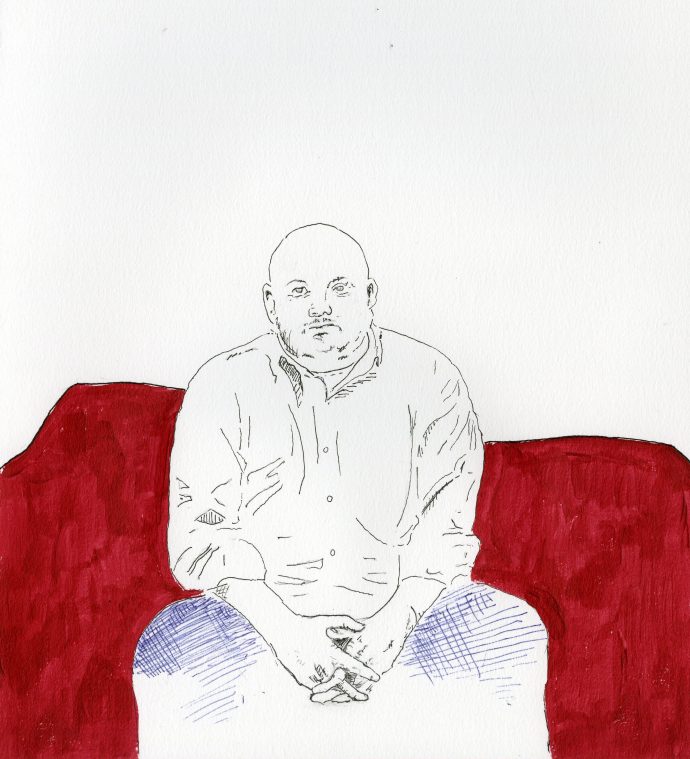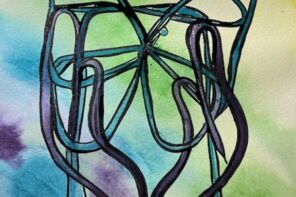Jeffrey Condran is the author of the story collection A Fingerprint Repeated. His debut novel, Prague Summer, was published by Counterpoint in August 2014 and received a 2015 Independent Publisher Book Award’s Silver Medal. His fiction has appeared in journals such as The Kenyon Review, The Missouri Review, and Epoch, and has been awarded the The Missouri Review’s 2010 William Peden Prize and Pushcart Prize nominations. He is an Assistant Professor of Creative Writing at the University of Arkansas at Little Rock and co-founder/publisher of an independent literary press, Braddock Avenue Books.
Curtis Smith: Congratulations on all the good things happening in your world. In the past couple years, you’ve put out a story collection and a novel. What came first for you—the desire to write stories or novels? Did you find one leading to the other? How do the processes differ for you?
Jeffrey Condran: Like many, I grew up reading novels, and so my first impulse was to write longer narratives. Even when I tried to write stories, my early readers often said, “This seems like it wants to be a novel.” I eventually worked out the subtleties of pacing for each form, but it took a long time and was painful.
The relationship between my story collection, A Fingerprint Repeated, and my novel, Prague Summer, is interesting in this way. The manuscript that eventually became Prague Summer first began as a failed novel, from which a single story was salvaged, which was then reimagined into the novel that was eventually publish by Counterpoint. The whole process took more than ten years—not something I recommend, but wonderful for learning craft. Looking back, I still find stories to be the most difficult. The near perfection that is required to make even a merely good story is daunting. Every time I begin a new story, it feels like a high wire act. This constant tension pushed me to make the framing of a story around a particular incident integral—and second nature—to my process. I spent a couple of years just gorging myself on short stories—James Salter, Christine Schutt, Tobias Wolff, and many, many more—so that the “moves” good story writers make became part of my unconscious repertoire. From my perspective, this is where the magic happens—these moments where the writer has put so much good material about structure and tone and character development into their heads that when it comes time to write, the fruits of that “underwork” are right there, ready to be plucked from a low-hanging branch.
This is a long-winded way of saying, I think, I’m pretty much saddled with the desire to keep writing in both forms.
CS: And as long as we’re talking process, I’m always curious about the routines of other writers. Do you plan out your work or just sit down and let it fly? Where does your writing fit into your daily life?
JC: Invariably, I sit down and write an outline of some type. Over the years they’ve become sketchier and sketchier, more like a vertical column of “moves” I want to make. When I start drafting, the language takes over and I write in whatever direction the story takes me. But then there’s almost always a moment where I pause for breath, so-to-speak, and leave the narrative dream behind and try to assess “where I am” in the story. At that point, I find myself drifting back to my outline and having a kind of “oh yeah” moment when I am reminded of some original vision I had and that can be used to bring the piece home. Every so often there’s nothing of value in the original outline for me to come back to and the piece has to sit until inspiration strikes. It’s always a potent reminder that there are very few moments of instant gratification in writing fiction.
I used to be a night writer. I liked the absence of light. The day was over and many of the stresses of daily life were behind me or being postponed. It seemed the perfect environment for the real world to fall away and fictional world to take over. For years, this worked out well for me.
Now, I’m starting to be old. I find that if I wait until 9pm-10pm to begin writing, my brain is often too fatigued to work its way into that unconscious stride where so much of the best writing takes place. So, these days I write first thing in the morning. The most I’ll do is get coffee and take my wife to work. No internet, no answering of emails. Only when I have my page or two, and feel that welling up of happiness that writing brings, will I stop and join the rest of the world.
Regardless of the time of day, though, what I’ve found to be most important over the years is that I create a routine and then stick with it. I’ve started to believe that it operates like muscle memory, if I find myself in the same place at the same time day after day, the writing becomes easier and easier. This is a moment where the conversation about the natural sympathy that goes on between writers and runners becomes really relevant to craft—or at least it does for me.
CS: I greatly enjoyed your story collection, A Fingerprint Repeated. We’ve both published with Press 53. Can you take us on that journey from when you first started shopping the manuscript until its publication?
JC: I didn’t yet have an agent when I began shopping the manuscript of A Fingerprint Repeated, and so avoided any attempts at sending the manuscript to the New York conglomerates. Instead, I entered some contests, made lists of independents I admired such as Coffeehouse Press, Sarabande, and Queen’s Ferry, and sent the collection to them.
Just about that time, Michael Kardos visited the University of Pittsburgh where I was working. Michael co-directs Mississippi State University’s creative writing program and, at the time, was the editor of their literary magazine, The Jabberwock Review. He invited me to send him a story that he later published, “The House of Terror.” Michael had recently published a collection with Press 53, and based on the strength of my story in the Jabberwock Review, introduced me to Kevin Morgan Watson, the publisher of Press 53. This introduction happened in middle of the insanity that is the AWP Bookfair. Nevertheless, about three months later, and the second day of my stay at the Sewanee Writer’s Conference, I had word that the collection had been accepted. It was a wonderful day. In that one moment, there was validation of how I’d been spending the previous decade of my life.
CS: A running theme in your work is the clash of cultures and religions. What draws you to this? What does it say about our culture? Our society?
JC: There are a couple threads to this interest. The first is that on the day of the September 11th attacks, I was teaching at La Roche college where a large number of my students were from Jordan, Palestine, Saudia Arabia, and Yemen. On that day, America’s political consciousness was pulled from a kind of regional naïveté into a new globalism, and the effect this had on the lives of my students was both profound and sad, and I wanted desperately to help tell their stories of being interviewed or arrested by the FBI and of being compelled, unfairly, to be the spokespeople for an entire culture and religion. The stories, I felt, would someday be theirs to tell, but in the moment they were not yet writers and I was. It felt to some degree like a moral imperative to try to do that work.
As time has gone by, I’ve started to think of my interests as a kind of literary globalism—work that attempts to show connections between cultures as the impact of globalism moves beyond the questions of politics and economics, where these ideas normally live. I’m particularly interested in expatriate Americans who, for various reasons, now find that the country of their birth no longer represents the best possible chance for happiness.
CS: You’re teaching now at the University of Arkansas. That’s a switch from your Pennsylvania roots. How’s that going? How does teaching impact your writing life?
JC: It’s always hard to leave a place where your memories and so much of your identity reside, but Arkansas is now being incredibly good to me. It is so deeply satisfying to spend my days teaching creative writing, thinking about it and talking about it and practically breathing it, is like a dream come true. I’m incredibly grateful to be here. Every day that I remind my students about some craft idea, I’m also reminding myself, confirming and reconfirming with new language the things that I know and that inform my writing.
CS: Writer, teacher, and to complete the trifecta, you’re also a publisher running your own indie press, Braddock Avenue Books. I’ve always admired the folks who do the publishing. It’s such a labor of love. How’s that experience been? What do you think the future holds for BAB?
JC: Telling someone that you’re publishing their book is the most exciting thing that I can to do. It doesn’t matter if the author is twenty-six or sixty-six, it’s a life-changing experience for them. To help create these moments by saying yes to a manuscript is just the best.
Since Robert Peluso and I started the business in 2012, we’ve added an imprint, Alleyway Books, that is dedicated to short fiction. And this year, we’re establishing a relationship with Kimbilio, the sister organization to Cave Canem, to help more African-American prose writers find their way into the public eye.
And we’re really excited in Spring of 2016 to reissue Chuck Kinder’s 1973 novel, The Silver Ghost. Many readers will know Chuck as the inspiration for Michael Chabon’s character, Grady Tripp, from Wonder Boys.
CS: What writers and books have had the greatest influence on your journey?
JC: Milan Kundera’s The Unbearable Lightness of Being, Diane Johnson’s Le Divorce, everything by James Salter, especially “American Express” and “The Cinema,” Alice McDermott’s Charming Billy . . . there are so many now.
CS: If you couldn’t be a writer, you’d be a . . .
JC: A bookseller. Well, okay, maybe a bartender.
CS: What’s next?
JC: I have a story collection that is oh-so-close to being done and the beginning of a new novel manuscript that will attempt to make us think about the gun question. I write this just as the news of the San Bernardino shootings is breaking. So yes, that book soon.
Curtis Smith’s most recent books are Beasts and Men (stories, Press 53) and Communion (essays, Dock Street Press). His next book, a study of Kurt Vonnegut’s Slaughterhouse-Five, will be published by Ig Publishing this spring.




